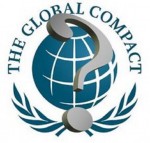 “And what’s this?” asks a bemused Olympics commentator as the middle distance race enters its final lap. “I don’t believe it … I really don’t believe it!” and the slightest trace of a giggle enters her voice.
“And what’s this?” asks a bemused Olympics commentator as the middle distance race enters its final lap. “I don’t believe it … I really don’t believe it!” and the slightest trace of a giggle enters her voice.
For round the track, overtaking all the runners, comes an athletic, well-muscled figure dressed in a baggy red suit with white fur trimmed collar and cuffs and holding a curvy bottle of a bestselling sugar-based fizzy drink.
“Yes indeed,” concludes the commentator, “Santa really has been working out! No more fat and flabby; no more shaggy beard. He’s fit and lean and ready to take on the World!”
When it comes to previously slow and cumbersome figures starting to show a little zing in their activities, the United Nations being tough with miscreants isn’t too far off the fantasy of a fit and active Santa.
A Brief Overview
The United Nations Global Compact was launched in 2004. It is founded upon Ten Principles which cover Human Rights, Labour Standards, the Environment and Corruption.
Members may be one of four types of organisation: businesses, labour organisations, civil advocates and academics. A further branch is focussed specifically upon urban regeneration and also accepts cities as members.
Companies who sign up to the UNGC commit to supporting the Ten Principles. However, this is very much a statement of intent and there is no formal, independent verification that companies put their words into actions.
Instead, once committed to the principles companies are expected to enter into dialogue with other stakeholders and agencies, using the UNGC as a facilitation body within which to open and sustain dialogue.
Stung Into Action
As they progress travel towards full implementation of the principles, signatories to the UNGC are expected to issue an annual “Communication of Progress” (COP).
The major flaw in self-certification procedures is that companies need to be motivated enough to properly engage with them, either through the kudos the scheme gives them or through other benefits which may accrue.
There was no perceivable kudos or benefits brought to participants by being a signatory to the UNGC, other than being associated with the United Nations. Companies signed up but then did little else to implement the principles.
This led many leading NGOs to accuse some companies of “bluewashing”: using their membership of the UNGC to make them appear sustainable while actually doing very little to advance the principles they’d signed up to.
On the eve of the 2007 annual UNGC summit in Geneva, four of these NGOs urged the UNGC to tighten up its act. Their criticisms included the accusation that existing standards were so lax they made the entire scheme a mockery which lacked any credibility.
Their comments appear to have had an effect. One of the key conclusions of the summit was the need to strengthen “the Global Compact’s integrity measures – for example through quality management and brand protection”.
Toughening Up
The UNGC’s 1997 annual review showed the extent of the problem. Overall, less than 70% of the companies signed up were considered active, with the figure being less than 50% in Asia, Africa and the Middle East.
Since the beginning of 2008 the UNGC has strengthened the “integrity measures” with the insistence that a COP is produced annually for a company to be considered active.
Since then, 630 companies have been delisted from the compact for being inactive, with a further 184 in danger of being delisted by the end of the year.
In total, this is over 20% of number of companies previously considered signatories to the UNGC at the beginning of 2008. In the same time period, only 701 companies signed up to the UNGC.
The Road to Regulation
It is highly significant that the United Nations has felt the need to impose sanction upon companies in order to preserve its credibility and avoid being discredited as a sucker who is easily taken advantage of.
Companies must sit up and take note of this development. Many governments take their lead from the United Nations, especially in areas such as sustainability where there is a palpable fear of acting unilaterally.
Furthermore, how sustainable business practice becomes the norm is largely in business’ own hands: either they set the agenda with voluntary measures, or it will be set for them through regulation.
When the rotund, slow moving and overweight organisation that is the United Nations opts for regulation over voluntary measures, business needs act fast before a trend is established.
Lucy is Editor at Corporate Eye




